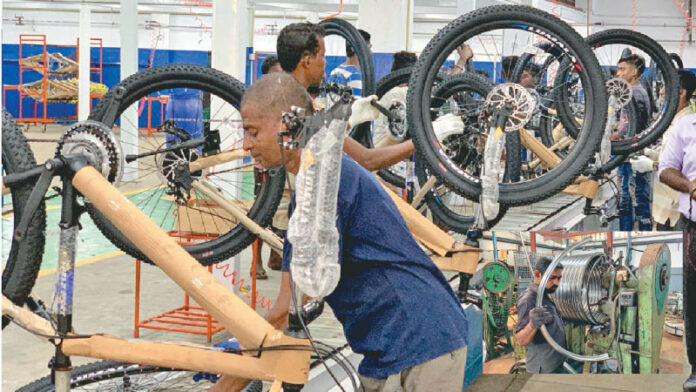By: Staff Writer
January 21, Colombo (LNW):
The Collapse of an Iconic Industry
The once-thriving bicycle industry of Sri Lanka is on the brink of collapse, with Lumala City Cycle Industries Manufacturing Ltd., a household name and one of the country’s oldest manufacturing giants, facing an unprecedented crisis.
For decades, Lumala not only symbolized Sri Lanka’s industrial prowess but also served as a vital economic contributor.
However, mounting challenges such as unfair market practices, excessive taxation on raw materials, and a flood of unregulated imports have brought this iconic company—and the broader industry—to its knees.
A Call for Urgent Government Intervention
Employees of Lumala are now calling for urgent Government intervention to prevent the shutdown of South Asia’s leading bicycle manufacturer. Based in Panadura, Lumala has been a cornerstone of Sri Lanka’s industrial sector for over five decades. However, escalating costs and unethical market competition threaten the company’s survival.
“The management has already begun a phased shutdown, closing the steel rim department and one of Sri Lanka’s few chromium plating plants. Further closures, including fork and mudguard production, alloy rim production, frame manufacturing, and the paint department, are imminent unless immediate action is taken.
Employees, many of whom have worked at Lumala for over two decades, now fear for their livelihoods,” said Lumala Factory General Manager Ranjith Siriwardana.
Challenges Undermining Local Manufacturing
Employees have identified several critical challenges driving Lumala’s crisis:
Unregulated Imports: The local market is flooded with imported bicycles and electric bicycles, many of which bypass regulatory checks.
Tax Loopholes: Certain trading companies allegedly exploit tax loopholes by misdeclaring imported parts as raw materials, evading customs duties and VAT. This enables them to sell substandard products at artificially low prices, undercutting domestic manufacturers.
Excessive Taxation on Raw Materials: While finished products are imported cheaply, raw materials for local production face heavy taxation, increasing costs and undermining competitiveness.
These challenges not only threaten ethical manufacturers like Lumala but also deprive the Government of substantial tax revenue.
Far-Reaching Consequences
If Lumala’s shutdown continues, the impact will extend far beyond the company. Hundreds of employees risk losing their jobs, including many who have dedicated decades of service. Renowned local suppliers who depend on Lumala’s operations will face disruption, and related industries such as motorcycles and motor vehicles—many of which rely on Lumala’s facilities for raw materials—may also suffer.
Despite achieving a local value addition of 50% to 70%, as verified by the Industries Ministry, Lumala’s concerns remain unaddressed, leaving employees disillusioned.
A Collective Plea for Fair Policies
In their collective plea, Lumala’s employees urge the Government to implement fair tax policies to eliminate unethical market practices and ensure consistent enforcement of regulations. They call for a comprehensive investigation involving the Industries Ministry, the Industrial Development Board (IDB), Sri Lanka Customs, and the Inland Revenue Department to address systemic challenges.
Employees emphasize that they are not seeking special privileges or tax cuts but a level playing field to compete fairly. They remain hopeful that timely Government intervention can prevent further job losses and halt the decline of Sri Lanka’s bicycle industry.
The fate of Lumala is a stark reminder of the urgent need to protect local industries, which form the backbone of the national economy.

